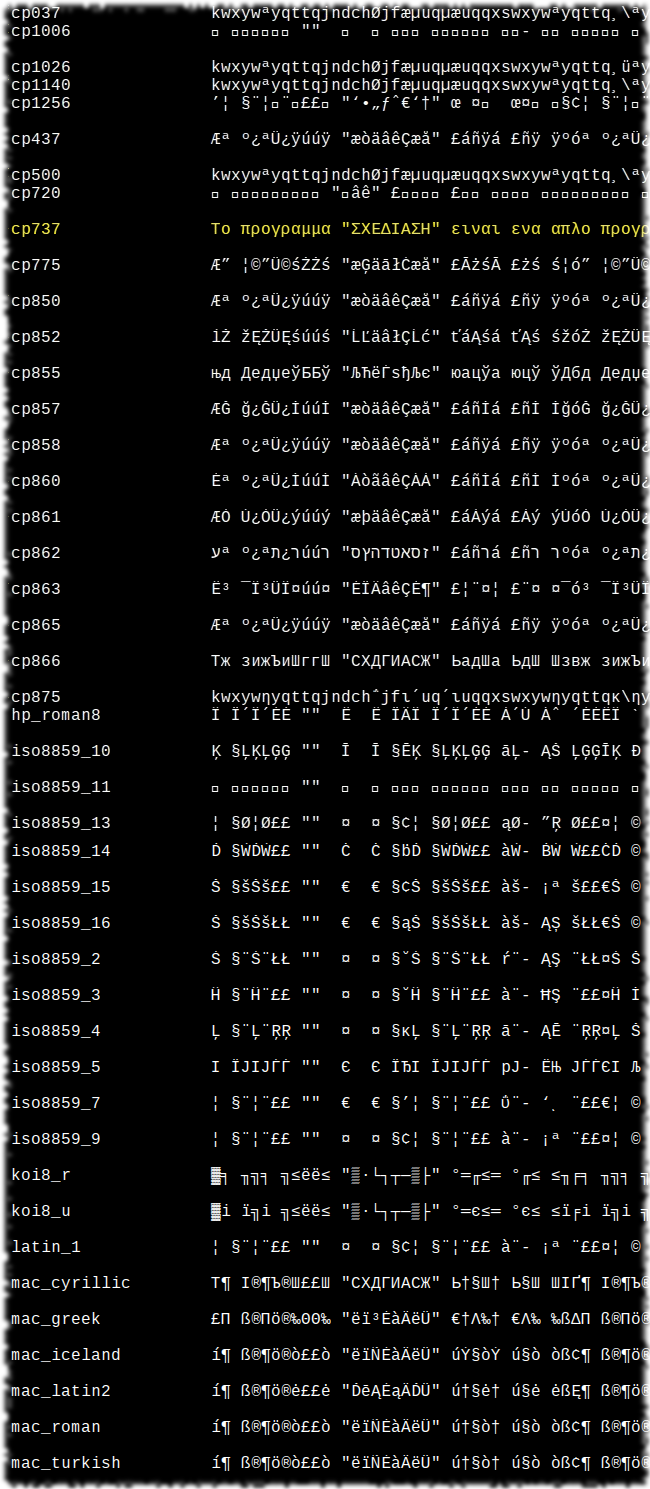How to determine the character encoding of a text file
Πως να αναγνωρίσετε την κωδικοποίηση χαρακτήρων ενός αρχείου κειμένου
IntroductionΕισαγωγή
If you have ever encountered a text file with gibberish characters, then you know that -many times- it is quite difficult to determine its correct character encoding.
Αν έχετε βρεθεί ποτέ αντιμέτωποι με ένα αρχείο κειμένου που περιέχει ακαταλαβίστικους χαρακτήρες, τότε γνωρίζετε ότι -πολλές φορές- είναι αρκετά δύσκολο να αναγνωρίσετε ποια είναι η σωστή κωδικοποίηση των χαρακτήρων.
There is an automatic universal encoding detector for Python 2 and 3 here: https://pypi.python.org/pypi/chardet. The chardet detector comes with a command-line script which reports on the encodings of one or more files:
Υπάρχει ένας εργαλείο ανίχνευσης της κωδικοποίησης για Python 2 και 3 εδώ: https://pypi.python.org/pypi/chardet. Ο ανιχνευτής chardet διαθέτει και ένα σενάριο για τη γραμμή εργαλείων που αναφέρει την πιθανή κωδικοποίηση ενός ή περισσότερων αρχείων
$ chardetect sometextfile
sometextfile: windows-1252 with confidence 0.5
Testing encodingsΔοκιμάζοντας κωδικοποίησεις
Unfortunately, chardetect does not always find the correct encoding. For example, I had a text file with a cp737 encoding but chardetect predicted an IBM866 encoding for that file (with a low confidence of 0.26). For these difficult cases, I wrote a tool which decodes one line from a text file using every (?) possible character encoding and saves the results to a new utf-8 text file (same filename + an '.encodings' extension). Now, we can examine this file visually to find out the correct encoding.
Δυστυχώς, όμως, το chardetect δεν βρίσκει πάντα την σωστή κωδικοποίηση. Για παράδειγμα, είχα ένα αρχείο κειμένου με κωδικοποίηση cp737 αλλά το chardetect προέβλεψε μια κωδικοποίηση IBM866 για εκείνο. Για τέτοιες δύσκολες περιπτώσεις, έγραψα ένα εργαλείο το οποίο αποκωδικοποιεί μια γραμμή από ένα αρχείο κειμένου χρησιμοποιώντας όλες (;) τις δυνατές κωδικοποίησεις και αποθηκεύει τα αποτελέσματα σε ένα νέο utf-8 αρχείο κειμένου (ίδιο όνομα αρχείου + μια κατάληξη '.encodings'). Τώρα, μπορούμε να εξετάσουμε οπτικά αυτό το αρχειο και να ανακαλύψουμε τη σωστή κωδικοποίηση.
Usage: test_encodings.py filename [number of line to test]
Χρήση: test_encodings.py όνομα_αρχείου [αριθμός γραμμής προς έλεγχο]
$ test_encodings.py sometextfile 3
Processing line number: 3
Writing successfully tested encodings in sometextfile.encodings
53 out of 111 tested encodings were written.
$ cat sometextfile.encodings

Having found the correct encoding, we can convert our text file to a different encoding using an editor (e.g. geany) or using a command-line tool (e.g. iconv):
Έχοντας βρει τη σωστή κωδικοποίηση, μπορούμε να μετατρέψουμε το αρχείο κειμένου μας σε μια διαφορετική κωδικοποίηση χρησιμοποιώντας έναν διορθώτη κειμένου (λ.χ. τον geany) ή κάποιο εργαλείο της γραμμής εντολών (λ.χ. το iconv):
$ iconv -f cp737 -t UTF-8 in.txt > out.txt
Source codeΠηγαίος κώδικας
Here is the code. It runs under both Python 2 & 3:
Ιδού ο κώδικας. Τρέχει τόσο στην Python 2 όσο και στην Python 3:
#!/usr/bin/env python
import io
import os
import sys
from encodings.aliases import aliases
encs = {
"ascii", "big5", "big5hkscs",
"cp037", "cp424", "cp437", "cp500", "cp720", "cp737", "cp775",
"cp850", "cp852", "cp855", "cp856", "cp857", "cp858", "cp860",
"cp861", "cp862", "cp863", "cp864", "cp865", "cp866", "cp869",
"cp874", "cp875", "cp932", "cp949", "cp950",
"cp1006", "cp1026", "cp1140", "cp1250", "cp1251", "cp1252",
"cp1253", "cp1254", "cp1255", "cp1256", "cp1257", "cp1258",
"euc_jp", "euc_jis_2004", "euc_jisx0213", "euc_kr",
"gb2312", "gbk", "gb18030", "hz",
"iso2022_jp", "iso2022_jp_1", "iso2022_jp_2", "iso2022_jp_2004",
"iso2022_jp_3", "iso2022_jp_ext", "iso2022_kr",
"latin_1", "iso8859_2", "iso8859_3", "iso8859_4", "iso8859_5",
"iso8859_6", "iso8859_7", "iso8859_8", "iso8859_9", "iso8859_10",
"iso8859_13", "iso8859_14", "iso8859_15", "iso8859_16",
"johab", "koi8_r", "koi8_u",
"mac_cyrillic", "mac_greek", "mac_iceland",
"mac_latin2", "mac_roman", "mac_turkish",
"ptcp154", "shift_jis", "shift_jis_2004", "shift_jisx0213",
"utf_32", "utf_32_be", "utf_32_le",
"utf_16", "utf_16_be", "utf_16_le",
"utf_7", "utf_8", "utf_8_sig",
"idna", "mbcs", "palmos", "punycode", "rot_13",
"raw_unicode_escape", "unicode_escape", "unicode_internal",
"base64_codec", "bz2_codec", "hex_codec", "uu_codec", "zlib_codec"
}
def write_encodings(filename, line_number, final_encoding):
# To ensure that we cover as many as possible encodings,
# we take the union between our predefined encoding set and the
# set of the values from the encodings.aliases.aliases.
encodings = encs.union(set(aliases.values()))
data = dict()
# Read line from file
try:
with io.open(filename, "rb") as f:
lines = f.readlines()
line = lines[line_number-1]
print("\nProcessing line number: " + str(line_number))
if len(line) < 3:
print("!!!Warning!!!: Possible empty line.")
print("")
except Exception:
_, err, _ = sys.exc_info()
print("Error reading " + filename)
print(err)
sys.exit(1)
# Decode it using every possible encoding
for enc in encodings:
try:
data[enc] = line.decode(enc)
except Exception:
_, err, _ = sys.exc_info()
print("Cannot decode using " + enc)
# print(err)
# We write the results in a new utf-8 text file
# We use the same filename + an '.encodings' extension
fpath = os.path.abspath(filename)
newfilename = fpath + '.encodings'
print("\nWriting successfully tested encodings in " + newfilename)
with open(newfilename, 'w') as out:
c = 0
for enc in sorted(data.keys()):
try:
out.write("%-20s" % enc)
if (sys.version_info[0] < 3):
line = data[enc].encode(final_encoding)
else:
line = data[enc]
out.write(line)
out.write(os.linesep)
c += 1
except Exception:
_, err, _ = sys.exc_info()
print("Cannot encode " + enc + " to " + final_encoding)
# print(err)
print("\n" + str(c) + " out of " + str(len(encodings)) +
" tested encodings were written.\n")
if __name__ == '__main__':
nargs = len(sys.argv)-1
if nargs < 1 or nargs > 2:
exit("Usage: test_encodings.py filename [number of line to test]")
if nargs == 2:
line_number = int(sys.argv[2])
else:
line_number = 1
write_encodings(sys.argv[1], line_number, 'utf_8')Download source codeΚατέβασμα πηγαίου κώδικα
You can download the full code listing here: test_encodings.py
Μπορείτε να κατεβάσετε τον πλήρη κώδικα από εδώ: test_encodings.py